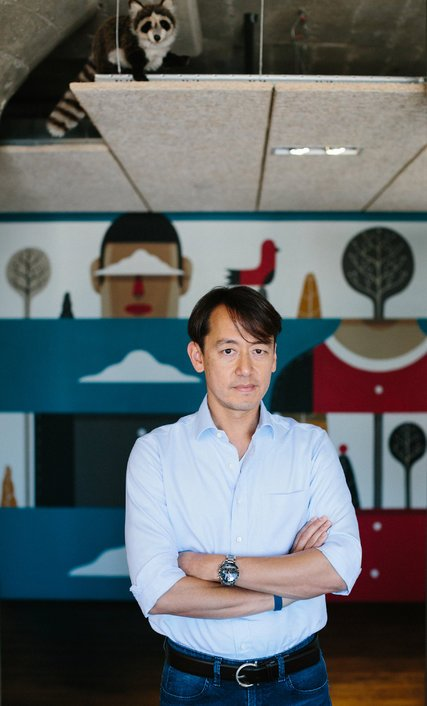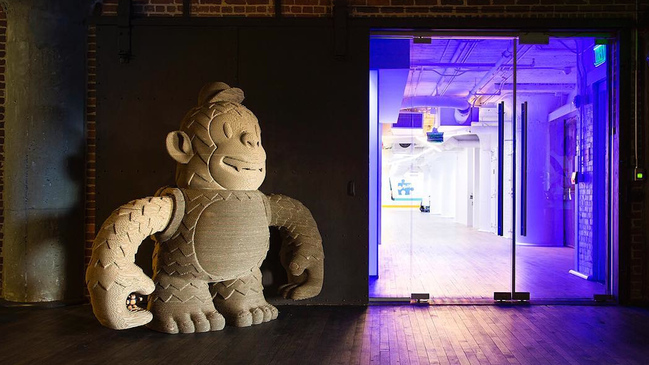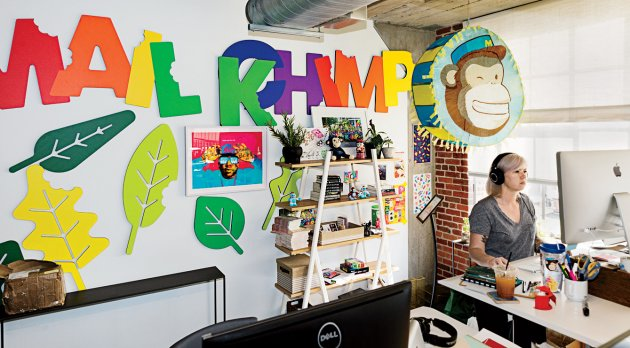The Patient Mailchimp Founders: A Mailchimp Success Story
As Thomas Edison said, “Many of life’s failures are people who did not realize how close they were to success when they gave up.”
However, patience is difficult to sustain in a business sphere that is increasingly characterized and sustained by quarterly earnings and quick results.
Indeed, in an age where companies like Instagram and Pinterest have become overnight successes, our expectations of what brands can or cannot do is greatly disconnected from reality.
Brands that have been around for a while need patience to turn them around. Don’t believe us? Ask the team over at Mailchimp.
 Image credit: Inc
Image credit: Inc
A case in patience: Mailchimp
“Patience is a virtue.”
That is indeed what we are told from a very early age. However, we are rarely taught how to be patient.
It is not something that is inherent in everyone—it is something that we consciously do. Like every hard-earned discipline, the more we practice at it, the more patient we become.
Ben Chestnut, the co-founder and CEO of Mailchimp understands this better than anyone. He is a classic example of the positive impact that patience and perseverance can have on a business.

Image credit: The New York Times
You may have heard of Mailchimp—the marketing platform targeted at small businesses. It allows you to send beautiful and creatively constructed emails to your customers, with reports that help you monitor how well your email campaigns are doing.
Millions of people and businesses use Mailchimp today to send a collected total of over 1 billion emails a day.
So how long did it take Mailchimp to become a successful well-known business? 17 years.
That’s right, it took 17 years of ups and downs, learning and perseverance for Mailchimp to maintain profitability. Today, the company continues to grow by more than $120 million per year, with more than 14,000 customers signing up every single day.

Image credit: Inc
The company was founded in 2001 by Chestnut and Dan Karzius, both web designers. The company started off as a side project while the two were working at their main web design consultation business, Rocket Science Group.
Chestnut, having grown up in a family of entrepreneurs, and being a small business owner, decided to start a company that helps small business owners to develop emails.
He initially wanted to build it as an email marketing channel for his clients since there was a demand for such software back in the early 2000s. So he set off, together with Karzius, with the idea of Chimpmail. Since the domain name was already taken, they settled for Mailchimp.
The journey was not easy. Young Mailchimp had to overcome many challenges, some of which seemed unbeatable at the time. It is perseverance and patience that made the company what it is today.
One of the key challenges they faced was the danger of being swallowed up by bigger and more powerful companies. Keep in mind that Mailchimp did not have much capital and they refused to onboard investors. So email marketing giants like Constant Contact often threatened the existence of their company.
But Chestnut and Karzius persevered to stay in the market and grow.
Their secret weapon against companies like Constant Contact was their extensive knowledge of how small businesses operate and what they need. The knowledge was their secret ingredient, which they used to keep the bigger and more powerful companies at bay, and to attract small businesses to Mailchimp.
The other key challenge they encountered was the fear that emails would eventually become obsolete. And given that their company was built around the continued use of emails, it was a legitimate fear.
They addressed the problem by diversifying their service offerings to other marketing channels like social media. They found a way to integrate those into their business as value-added services.
Mailchimp’s fortunes also began to change when they decided to make the service free to use. This decision tied in well with their passion for helping small businesses, whose early struggles they knew about all too well.
The decision to go Freemium paid off in leaps and bounds as membership grew exponentially.
They now boast $525 million USD in annual revenue.

Image credit: The New York Times
What we can learn from Mailchimp
Be patient and grow with your company
A key lesson that Ben Chestnut mentions time and time again, is the importance of growing with your company.
What this means is that growth brings on more responsibility and expectation of customer satisfaction.
Chestnut also highlights the importance of keeping hold of new ideas as they come: writing them down and filing them away as you never know when they will be useful.
He also stresses to never shy away from keeping an eye out on new opportunities. By listening to what your customers are asking, your company can be presented with new avenues for growth.
The bottom line, according to Chestnut, is to stick with it: every business faces tough times, but his decade-long wait for business success has definitely paid off.
If you really believe in the value of your business, then you should never give up on pursuing success.
And despite the remarkable success of Mailchimp, Chestnut does not feel that they have reached their final goals. He explains that there is still so much to be done—with every milestone that is reached, new targets must be set.
Indeed, a growth mindset is essential for every business. And that undoubtedly requires an arduous exercise in patience.
Be patient every step of the way
Patience does not mean idly waiting.
Practicing patience is an active state. It means that whilst you understand that some things are not in your control, such as a client’s decision to engage, renew, or retain your services, you continue moving slowly but steadily towards your goals.
If you are only just starting out, impatience is common. You may be in a hurry to realize success, to build your loyal customer base, and to close deals. It is important even in this early stage that you understand that clients often need time, even when time is seemingly of the essence.
Avoid getting dismayed or discouraged.
You don't want to unduly push a client or pose unreasonable ultimatums, as this can backfire and damage the reputation of your business. Reasonability and reliability are two words that you want to be associated with your brand.
Patience delivers rewards

Image credit: Inc
Impatience is as much a habit as patience is. When we lack patience, we are not able to delay gratification which results in frustration. And frustration is what drives us to quit.
When we are impatient, we are unable to work towards our business goals in a disciplined and dedicated manner. We quit in order to start over again and the cycle continues.
So, motivate yourself to develop the habit by thinking about the guaranteed rewards (be it greater sales, positive recognition, more profits, a promotion, increased customer satisfaction, etc.) that will come from developing the habit.
The founders of Mailchimp are an example that patience delivers results.
Patience results in smart decision-making
Patience is one of the best resources you can deploy when it comes to making good decisions. Similar to the decision Mailchimp made to offer their email marketing services for free in its early stages.
Many people in business, like Chestnut and Karzius, are looking for an edge over their competition and ways to improve their performance.
Having a seemingly solid business plan or hosting the best talent cannot act as a substitute for the virtues you need to guide and direct your business.

Image credit: Business Insider
Patience is one of those virtues. When we are patient, we remove ourselves from the negative stories that more often than not cloud our judgment.
We don’t live in a world of “what-ifs” that are destructive to our capacity to make sound decisions. When we are patient, we are more mindful to stop and focus on the present.
In being in the moment, we can make wiser choices and take both the big and small picture into account.
Patience builds reputations
Successful business people usually stay ahead of the pack by mastering skills that are guaranteed to make them successful. And patience is one of those skills.
Patience gives us grit and the ability to work steadily towards our goals. Just ask Chestnut and Karzius.
When we reach said goals, consistently, we begin to build reputations. Indeed, excellent, solid reputations are built through perseverance and not giving up.
And it is when we persevere, despite the odds, that we achieve great success. Any project or task you embark on requires total dedication.
Patience hones self-awareness
Patience gives us direct control over ourselves which is vital for success. When we are patient, we give ourselves valuable time to respond to certain events and developments as opposed to getting hijacked by our own emotions.
It allows us to stay composed no matter what is happening around us.
We also build trust in our ability to deal with whatever obstacles we encounter.
On the other hand, lack of success or progress in any of our endeavors can usually be attributed to a lack of patience. And the primary reason for impatience is a lack of control.
When we don’t have a sense of control, we don’t have an understanding or insight. And when we lack those two things, we don’t have the ability to effectively communicate, set realistic expectations and to plan.
By exercising control over those impulses, we get to experience the rewards that patience delivers.
Patience makes us more tolerant
Patience increases our tolerance. That is because patience enables us to preempt the obstacles on our path and deal with them tactfully. Those who practice patience foresee challenges and deal with them with courage, strength, and confidence.
Sure, emotional instability is a characteristic of any challenge and obstacles are part of any business.
However, the better you are at rolling with the punches and learning to ride the ebbs and flows of the cycles of success, the less anxiety you suffer and the tougher you become.
Patience brings hope
Patience provides an enduring belief in the goals that you are trying to achieve. When you have hope, you also have a natural resilience and willingness to keep going until you succeed.
Patience hones company culture
The main focus and goal of any business leader or company is to set the attitude or emotional tone of its culture. If the culture of your company is right, then all of the other components for success will fall into place.
The development of Mailchimp’s culture is a fitting example, who have built an engaging, fun, quirky and witty culture.

Image credit: Fast Company
Chestnut and Karzius took the time to ensure that their entire team was focused on their core objectives while being as motivated and dedicated to achieving them as they were themselves.
The founders recognized the value of a strong team, which is what will take you far in the business world.
They also recognized the importance of patience in building a strong team. When we exercise patience, we treat others around us with decency and respect which in turn increases reciprocity. In addition, we become better people, managers and business leaders.
Patience helps you to deal with competition
Your business will always have competitors, and some may have considerably more experience than you do.
When it is not possible to outrun your competitors, focus on distinguishing factors and unique selling points of your own business. For Mailchimp, the unique selling point was their passion and understanding of small businesses.
Of course, there was competition but that didn’t stop them from believing that their business wouldn’t grow. It just meant that they had to exercise patience in seeing the results they wanted.
Patience results in excellence
At the heart of every successful business is the belief or awareness of the trials and tribulations of success and the confidence that by being patient and not giving up, something noteworthy will be realized.
In that way, true genius is synonymous with a greater propensity for patience.
Ask any business with a strong brand: building a brand takes time, patience and commitment.
Mastering patience will only lead to success
The underlying message of Ben Chestnut and Dan Kurzius’ 18-year devotion to their company is that perseverance and patience are indeed compatible. Practice both and you will make it.
A good businessperson gets where they are by using patience to make sound decisions that are directed by solid values as opposed to impulse. They also used patience to negotiate, communicate, build strong teams and meet strategic goals.
Indeed, patience serves businesspeople well and also serves us all in life as a whole.




